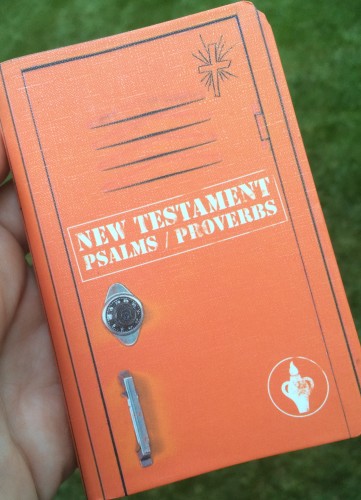TWH — The struggle for religious freedom, or freedom from religion, within the U.S. public school system is ongoing. As part of the government system, no preference of one religion over another is permitted on school property or within the buildings. However, in practice that is not always the case and, in areas where religious diversity is increasing, problems and challenges naturally arise.

[H. Greene.]
* * *
FLORIDA — Although legislators were unwilling to consider banning assault rifles in the wake of the Parkland school shooting, members of the state’s house of representatives were overwhelmingly in favor — 97 to 10 — of requiring the state motto of “in god we trust” to be prominently displayed in public school buildings.
Sponsored by Jacksonville Democrat Kimberly Daniels, the operative portion of H.B. 839 read:
Each district school board shall adopt rules to require, in all of the schools of the district and in each building used by the district school board, the display of the state motto, “In God We Trust,” designated under s. 15.0301, in a conspicuous place.
Daniels, herself a Christian minister, recalled in a speech before her colleagues that she’d had a vision of her deity, during which she was advised, “‘Do not politicize what has happened in Florida and do not make this a thing of division.'”
If this measure passes into law, it could well have that very effect.
In an opinion piece for the Patriot-News, Kirstin Snow asks, “Whose god?” She further recounts how the national motto — unofficially “e pluribus unum” for over a century— was officially replaced with “in god we trust” to contrast Americans with communists and adds, “The change was a mistake that violated the First Amendment to the U.S. Constitution and betrayed the secular values upon which the U.S. was founded as well as the explicit intentions of the founding fathers.”
The comments on Snow’s piece highlight the tensions. There are attacks on the writer’s character, but also remarks such as, “Not a wonder that Kirstin would mock having faith honored in the school system instead of it being denigrated. Faith is the foundation of morality and good behavior. Can’t have that can we?”
On the other side, one reader posts, “I think this is what they call dog whistles, but I might be wrong. Deflect? They just passed a bill that will be litigated, caring little about taxpayer funds being used to defend the indefensible, against the Constitution. I think this is for their base, who are really godless. Ridiculous.”
As of this writing, there were 191 additional comments arguing passionately on both sides of the question.
Judges have created the concept of “secular deism” in an attempt to resolve that controversy, but if anyone chooses to sue over this it will reopen that discussion for closer inspection. As always, the personal biases of judges sitting on such a case — as well as those of the governor or president who appoint them — will factor heavily.
The Florida bill was passed by the state house and is now moving to the state senate.
* * *
SIBLEY, La. — Municipal divisions in this state are called “parishes” as a reflection of the Roman Catholic faith of French and Spanish colonists who were the first Europeans to settle here, and that Christian ethic remains strong. In a report at Salon, ACLU attorney Bruce Hamilton said, “The practice of schools sponsoring and promoting religion, particularly the Christian religion, is pervasive and systemic and goes back many years.”
In an interesting twist, it’s a Christian mother who is suing to end the practice of children reading the “Lord’s Prayer” over the public address system in the Webster Parish school system. While her daughter is agnostic, Christy Cole’s problem with that and similar practices is based on an injunction in the book of Matthew against public prayer.
She’s leveled many complaints in recent years, and according to the Salon article, “school officials would often respond by accusing her of not being a Christian or understanding Christianity.”
The justification for the daily recitation is that the readers are all student volunteers, although it’s not entirely clear if any of them feel coerced. In any case, children in the classrooms stand and join in; when Cole’s daughter remained seated, she was bullied by other students while a teacher did not intervene.
Additionally, allegations against the parish system include that teachers have claim evolution is a “fairy tale.” That’s not news; as we reported in 2015, as many as one in eight biology teachers in that state advocate for creationism.
Students also receive regular visits from Christian ministers in the school, which no doubt is a practice which raised fewer eyebrows when Christianity was simply assumed to be practiced by all members of the school community.
In December, the ACLU filed suit against the Parish, whose current superintendent, when confronted, was quoted as saying, ““I’ll stop when someone makes me stop.”
* * *
We will follow both these stories and provide updates as warranted.
The Wild Hunt is not responsible for links to external content.
To join a conversation on this post:
Visit our The Wild Hunt subreddit! Point your favorite browser to https://www.reddit.com/r/The_Wild_Hunt_News/, then click “JOIN”. Make sure to click the bell, too, to be notified of new articles posted to our subreddit.